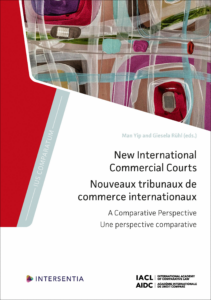Out now: New International Commercial Courts
 Over the past two decades, various jurisdictions around the world have created new specialised domestic courts to resolve international commercial disputes. Located in the Gulf region (Abu Dhabi, Dubai, Qatar), in Asia (Singapore, China, Kazakhstan) and in Europe (Germany, France, the Netherlands), these courts enrich the current landscape of the resolution of international commercial disputes. In particular, they present themselves as alternatives to litigation before ordinary courts, on the one hand, and to international commercial arbitration on the other.
Over the past two decades, various jurisdictions around the world have created new specialised domestic courts to resolve international commercial disputes. Located in the Gulf region (Abu Dhabi, Dubai, Qatar), in Asia (Singapore, China, Kazakhstan) and in Europe (Germany, France, the Netherlands), these courts enrich the current landscape of the resolution of international commercial disputes. In particular, they present themselves as alternatives to litigation before ordinary courts, on the one hand, and to international commercial arbitration on the other.
In a recently published book – edited by Man Yip from Singapore Management University and me – we study international commercial courts from a comparative perspective and through various strands of inquiry. First, we offer a detailed analysis of the reasons for the creation of these courts and examine their jurisdictional, institutional and procedural features. Second, we scrutinise the motivations and/or constraints of jurisdictions that have decided against launching their own versions of ‘international commercial courts’. Finally, and most crucially, we systematically review the impact and the success of these courts addressing questions such as: what are the metrics of success, and is success wholly dependent on size of the docket? What role do the courts play in international commercial dispute resolution? What contributions can we expect from them in the future? Are these courts necessary? In addressing these questions, we hope that the book advances our understanding of the role of international commercial courts in the resolution of cross-border disputes.
The book is the result of comparative study prepared for the General Congress of the International Academy of Comparative Law that was held in 2022 in Asunción (Paraguay). It contains 21 national and special reports written by a stellar group of authors:
- Martin Bernet (Bernet Arbitration/ Dispute Management, Switzerland)
- Pamela Bookman (Fordham University, United States)
- Michael Byrne (Dubai International Financial Centre Courts, Dubai),
- Tatiana Cardoso Squeff (Federal University of Rio Grande do Sul, Brazil)
- Gustavo Cerqueira (University of Côte d’Azur, France)
- Edyta Figura-Góralczyk (Cracow University of Economics, Poland),
- David Foxton (High Court of England and Wales, United Kingdom),
- Hoang Thao Anh (University of Law, Hue University, Vietnam),
- Zhengxin Huo (China University of Political Science and Law, People’s Republic of China)
- Saloni Khanderia (OP Jindal Global University, India)
- Kwan Ho Lau (Singapore Management University, Singapore),
- Seipati Lepele (University of Pretoria, South Africa)
- Claudia Lima Marques (Federal University of Rio Grande do Sul, Brazil)
- Chien-Chung Lin (National Yang Ming Chiao Tung University, Taiwan)
- Michele Angelo Lupoi (University of Bologna, Italy)
- María Blanca Noodt Taquela (University of Buenos Aires, Argentina),
- Peter Nørgaard (Danish Ministry of Justice, Denmark)
- Maria Panezi (University of New Brunswick, Canada)
- Thomas Riehm (University of Passau, Germany)
- Clement Salung Petersen (University of Copenhagen, Denmark),
- Elsabe Schoeman (University of Pretoria, South Africa)
- Florian Scholz-Berger (University of Vienna, Austria)
- S.I. Strong (Emory University, United States)
- Willem Theus (KU Leuven and UCLouvain, Belgium)
- Quirin Thomas (University of Passau, Germany)
- Geert Van Calster (KU Leuven, Belgium)
- Vu Thi Huong (University of Law, Hue University, Vietnam)
- Marlene Wethmar-Lemmer (University of South Africa)
More information about the book is available here.


